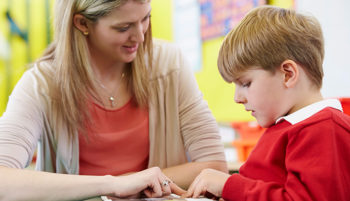Focusing on Your Child’s Learning Progress and Not Perfection
“Take pride in how far you’ve come. Have faith in how far you can go. But don’t forget the journey.” by Michael Josephson
 We knew the school year would end when the year started, but never realized how fast it would come. It’s hard to stop, step back, and just look at how far we’ve come. The mountains we have climbed or the forever-long valleys that we thought would never end, but we did it. We all did hard things. We grew.
We knew the school year would end when the year started, but never realized how fast it would come. It’s hard to stop, step back, and just look at how far we’ve come. The mountains we have climbed or the forever-long valleys that we thought would never end, but we did it. We all did hard things. We grew.
As a special education teacher, I’ve had the privilege of watching hundreds of students grow academically, socially, emotionally, and personally. Some students leap ahead quickly, others take smaller steps, and a few struggle quietly in the shadows. But one thing I’ve learned is this: progress looks different for every child, and it all matters. Every small victory, no matter how tiny it may seem, deserves to be celebrated at the end of the year or whenever they happen. [Read more…]

Alison Whiteley has been a special education teacher for over 15 years, spending most of her time working with elementary students and families. After graduating from the University of Colorado with a Bachelor of Arts in Special Education and Psychology, she continued her education with a Masters in Reading from Walden University. In addition, she has achieved endorsements supporting Early Childhood Special Education and Diverse Learners which she uses to help identify needs across all learners.
Ms. Whiteley is trained in Wilson Reading System and Yoshimoto Orton-Gillingham. She believes all students can learn to read and be successful. She has served as a Special Education Coach and Mentor to fellow specialists and teachers, facilitated the creation of her elementary school’s Response to Intervention/Multi-Tiered Systems of Support (RTI/MTSS) process and helped parents through the Special Education process as IEP Coach for parents. In 2013 she completed the National Boards of Professional Teaching in Exceptional Needs with recertification in 2022. Her areas of expertise involve working with students with learning disabilities, supporting stakeholders moving through the special education process, and helping parents and teachers understand what they can do to support struggling learners in the public school settings.
She is a founding member of the Colorado Reading League and a member of the International Dyslexia Association in Colorado. Alison has two greyhounds and two nephews who keep her busy outside of school. She is the CEO of Toad-ally Exceptional Learners at http://www.toad-allyexceptionallearners.com. Alison is a valuable source of information to support teachers and parents, although she is not a lawyer and does not give legal advice. Her services support families through the IEP process and how they can be an equal member of the team through positive interactions. She focuses on collaboration and using tools to take IEPs to the new level of helping students achieve.
 Helping Kids with ADHD Focus: Classroom and Home Strategies
Helping Kids with ADHD Focus: Classroom and Home Strategies Why Does My Child Need Assessments?
Why Does My Child Need Assessments?
 ls, rainy days mean canceled recess, and that lack of movement can lead to restlessness and frustration. Getting outside, even in less-than-ideal weather, helps with attention, sensory processing, and emotional regulation.
ls, rainy days mean canceled recess, and that lack of movement can lead to restlessness and frustration. Getting outside, even in less-than-ideal weather, helps with attention, sensory processing, and emotional regulation.